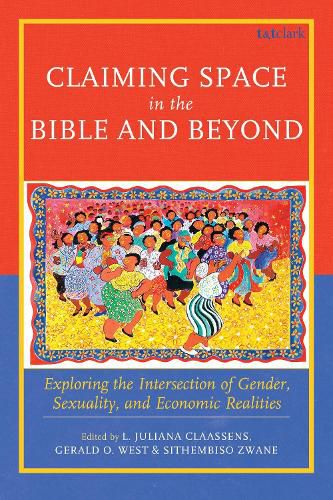Readings Newsletter
Become a Readings Member to make your shopping experience even easier.
Sign in or sign up for free!
You’re not far away from qualifying for FREE standard shipping within Australia
You’ve qualified for FREE standard shipping within Australia
The cart is loading…






This collection of essays explores the way individuals and communities navigate complicated spaces which have been dominated by econo-heteropatriarchal powers to find their voice and claim their space.
Using concepts of space from development studies, the volume explores the power of biblical narratives for communities to navigate the complex and multifaceted intersections between gender, sexuality, ethnicity, and economics in the biblical text as well as within the diverse interpretive communities the chapter authors represent. In particular, these contributions are interested in the role of art as a way for individuals and communities to exhibit their agency and so transform hostile spaces in which they inadvertently find themselves.
The work is divided into three sections: Claiming Space in the Community, Claiming Space in the Text, Claiming Space in/through Art. The contemporary contexts engaged with include South Africa, India, Brazil, Aotearoa New Zealand, the margins of the United States of America, and Australia. Within these contexts a diverse range of communities struggle "to claim space," including unemployed young people, LGBTIQA+ communities, women migrant workers, survivors of sexual violence, women struggling to survive economically, ethnic others, women at home and at work, women lamenting and resisting imperialisms, colonial settlers, aboriginal people, LGBTQIA+ Christians, black women and children.
$9.00 standard shipping within Australia
FREE standard shipping within Australia for orders over $100.00
Express & International shipping calculated at checkout
Stock availability can be subject to change without notice. We recommend calling the shop or contacting our online team to check availability of low stock items. Please see our Shopping Online page for more details.
This collection of essays explores the way individuals and communities navigate complicated spaces which have been dominated by econo-heteropatriarchal powers to find their voice and claim their space.
Using concepts of space from development studies, the volume explores the power of biblical narratives for communities to navigate the complex and multifaceted intersections between gender, sexuality, ethnicity, and economics in the biblical text as well as within the diverse interpretive communities the chapter authors represent. In particular, these contributions are interested in the role of art as a way for individuals and communities to exhibit their agency and so transform hostile spaces in which they inadvertently find themselves.
The work is divided into three sections: Claiming Space in the Community, Claiming Space in the Text, Claiming Space in/through Art. The contemporary contexts engaged with include South Africa, India, Brazil, Aotearoa New Zealand, the margins of the United States of America, and Australia. Within these contexts a diverse range of communities struggle "to claim space," including unemployed young people, LGBTIQA+ communities, women migrant workers, survivors of sexual violence, women struggling to survive economically, ethnic others, women at home and at work, women lamenting and resisting imperialisms, colonial settlers, aboriginal people, LGBTQIA+ Christians, black women and children.